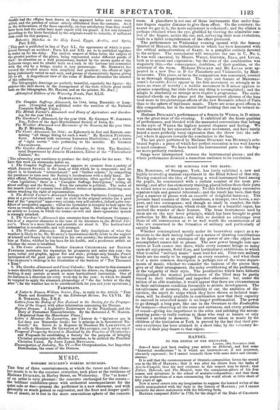MUSIC IN SCHOOLS FOR THE BLIND.
MR. Roanrsox, of Stonegate, York, has lately exhibited a new and highly-interesting musical experiment in the Blind School of that city.
Having conceived the idea of forming a wind-instrument band among the pupils, he commenced with a certain number of the most pro- mising; and after due elementary training, placed before them their parts
in raised notes to commit to memory. To this followed many successive separate trials and general rehearsals ; and the result has been, that they play a number of pieces with an ensemble of delightful harmony. The juvenile baud consists of three trombones, a trumpet, two horns, a ser- pent, and two cornopeans ; and though so small in number, the rich- ness of their combinations, which rivals those of a beautiful organ, has excited the wonder of their hearers. The brass instruments used by them are on the new lever principle, which has-been brought to great perfection by Mr. KOHLER ; and with so decided an advantage over those of old construction as to be well worth the examination of all who are concerned in the formation of military and particularly of cavalry bands.
Whether contemplated merely under its benevolent aspect as a re- creation to the dark society itself—as a means of drawing contributions to its funds—or as an extension of the power of art—the object here accomplished cannot fail to please. The new power brought into ope- ration at York cannot rest there, while every summer brings so many open-air enjoyments, floral fetes, and horticultural exhibitions, to which what is called "military music" must lend her aid. First-rate military bands are too costly to be engaged on every occasion ; and what there is of a more common description is perhaps one of the worst depart- ments of music, whether we consider the badness of the pieces they give or of their arrangement, the noisy overblowing of the performers, or the vulgarity of their style. The peculiarities which have hitherto distinguished the musical performances of the blind may be partly traced to their traditional and imperfect education: bat, under the tuition of an able musician, it would appear that there are circumstances in their unfortunate condition favourable to artistic development The retentiveness of memory, the sensibility of ear, the ambition of dis- tinction, the esprit de corps which they have shown as isolated musi- cians, will be doubly available in combination now that their capacity to succeed in concerted music is no longer problematical. The power to go through a long part, like one in the Overture to the Zauberfible for instance—observing all the rests and entrances, and every gradation of sound—giving due importance to the solos and subduing the accom- panying parts—is really curious to those who read at leisure or only commit a melody to memory. The interest taken in music by the children of the institution at York is proved by the fact that their pre- sent excellence has been attained in a short time, by the voluntary de- votion of their play-hours to that object.


























 Previous page
Previous page